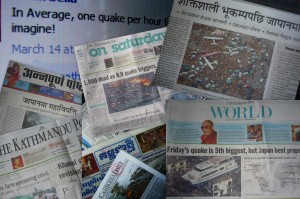Search Results for Tag: radiation
How media in the Philippines report on Japan
By Leo Gatdula, Manila
 The powerful earthquake that rocked Japan on March 11, 2011 is big news in the Philippines not only because of the extent of the disaster itself, but also because there are about 300,000 Filipinos in Japan.
The powerful earthquake that rocked Japan on March 11, 2011 is big news in the Philippines not only because of the extent of the disaster itself, but also because there are about 300,000 Filipinos in Japan.
The Philippine media have focused their coverage on the plight of Filipinos working in the richest country in Asia. Every day, Filipinos in the Philippines are provided with reports about how much some Filipinos in Japan want to return to the Philippines and how they are coping with the tragedy.
Focusing on Filipino workers in Japan
Overseas Filipino Workers (OFWs) in Japan and other parts of the world send billions of dollars back home, helping keep the Philippine economy afloat. It’s one of the reasons why they’re called “modern-day heroes” in the Philippines.
Thus, an OFW-related event is bound be an emotionally charged issue in the country. Whether it’s Filipino sailors seized by Somali pirates or Filipino workers fleeing violence-torn Libya, an OFW-related event will get big-time coverage in the Philippines.
![]() read more
read more
Japanese tragedies stir nuclear debate in Indonesia
By Permadi Kencono Wulan
 From Indonesia former DW-AKADEMIE trainee Permadi Kencono Wulan writes that almost all of the country’s media have been covering the events in Japan from the moments they began. Focus has been on memories of the tsunami that happened in Indonesia, the strength and fortitude of the Japanese people, the impact of the damaged nuclear reactors and on Indonesian eyewitnesses who had been living in Japan, alongside interviews with celebrities who have lived there.
From Indonesia former DW-AKADEMIE trainee Permadi Kencono Wulan writes that almost all of the country’s media have been covering the events in Japan from the moments they began. Focus has been on memories of the tsunami that happened in Indonesia, the strength and fortitude of the Japanese people, the impact of the damaged nuclear reactors and on Indonesian eyewitnesses who had been living in Japan, alongside interviews with celebrities who have lived there.
News also stirred about Japanese adult film star Miyabi who had gone missing after the tsunami. Much news space in Indonesia was devoted to coverage of the evacuation and the impact of the nuclear reactors at Fukushima.
The impact of an exploding nuclear reactor
Permadi, who is head of new media at RRI Indonesia, highlighted early reports by Indonesia’s Metro TV on the impact of a nuclear reactor that exploded and the possibility of radiation. It communicated how this concerns the world community at large and Indonesia in particular because of the effects of radiation that might spread due to wind, sea water, birds and migrating fish.
![]() read more
read more
Asian media coverage of Japan in crisis
 Recent events in Japan shocked the world. The magnitude 9.0 earthquake that hit on March 11th and the tsunami and nuclear disaster it triggered have been top developing stories for media everywhere. But the focus and style of reporting differ from one country or region to the next.
Recent events in Japan shocked the world. The magnitude 9.0 earthquake that hit on March 11th and the tsunami and nuclear disaster it triggered have been top developing stories for media everywhere. But the focus and style of reporting differ from one country or region to the next.![]() read more
read more



